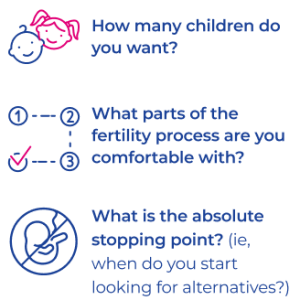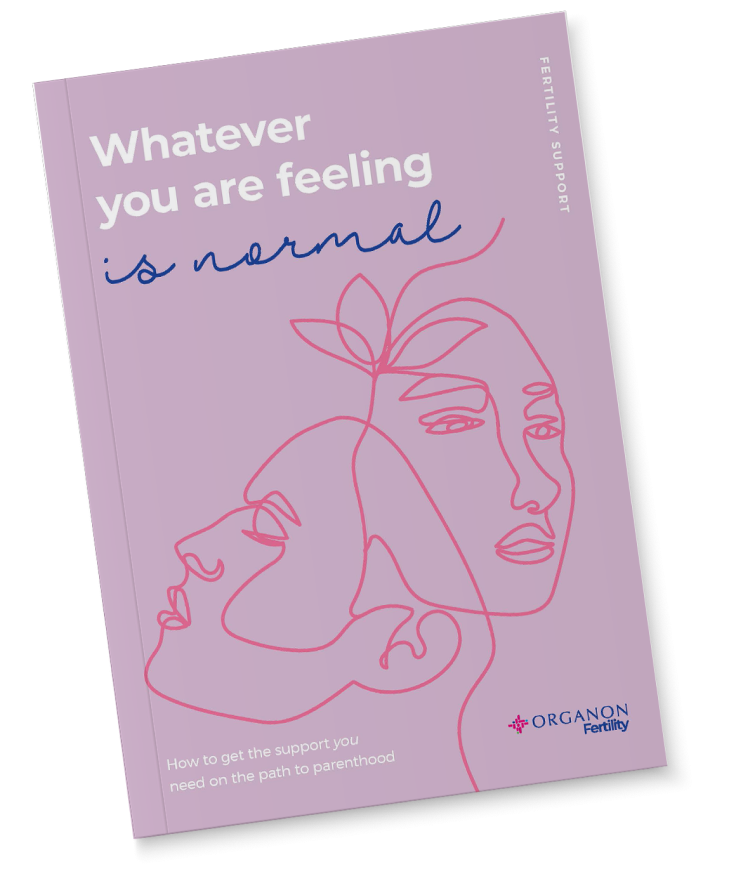Not everyone will experience emotions in the
same way, and it’s likely that couples won’t either.
Based on how you are feeling, try some of these tips to help find relief
Based on how you are feeling, try some of these tips to help find relief

Disbelief, confusion, frustration
Seek answers
Do your research. Ask questions and gather responses from fertility experts or even friends or family that may have gone through it before.
Shock, embarrassment
Try time out
Do something you enjoy. Let the information sink in while you engage in activities that usually bring you joy.


Sadness, grief, loss, shame
Consider speaking to someone you trust
Even if you are someone who tends to bottle up your emotions, reach out to a person you find comfort in when you feel ready. This person can be a friend, a partner, a family member, or even a trained professional. This may help you to release those feelings.
When starting on the path to parenthood, make sure you are clear on expectations.
And if you are undergoing this process with a partner, make sure that you are both on the same page.
Some key questions to consider


And if you are undergoing this process with a partner, make sure that you are both on the same page.
Some key questions to consider


Common questions you may have about sex
Let’s talk about sex4
Yes, talking about sex can be uncomfortable, but for heterosexual couples, sex does play a role in improving the chances of fertility. And you may have heard some ‘tried and true’ methods to improve your odds, but which ones are actually true?
Not every day. But every other day during ovulation may help increase your chances of conception.
Unfortunately, there is no magical position that has been proven to work. Frequency (as mentioned, every other day during ovulation) will be more impactful.
Be careful by reading the labels. While some lubrication products are safe for couples looking to conceive, some may actually contain spermicide, which kills sperm.
Sperm are motile, so there is no need to remain lying down to improve the chances of conception.

What are some proactive steps you can take to support your fertility journey?
Learn more- Edwards T (host). The emotional impact of infertility and how to heal (audio podcast episode). July 2020. In: Time to talk fertility. Fertility Centers of Illinois. Available at: https://podcasts.apple.com/us/podcast/the-emotional-impact-of-infertility-and-how-toheal/id1509590457?i=1000486531663. Accessed January 2024.
- Centre of Perinatal Excellence. When becoming pregnant isn’t easy. Available at: https://www.cope.org.au/planning-a-family/happening. Accessed January 2024.
- Simionescu G, et al. Exp Ther Med 2021; 21(4): 306.
- Uhler M (host). 20 fertility myths: true or false (audio podcast episode). September 2020. Doctor Podcasting. Available at: https://radiomd.com/audio-player/fcionlineg/item/42997-20-fertility-myths-true-or-false. Accessed October 2022.
- Harrison C, et al. Hum Reprod 2022; 37(3): 488–98.
- Newman JE, et al. Assisted reproductive technology in Australia and New Zealand 2020. Sydney: National Perinatal Epidemiology and Statistics Unit, UNSW Sydney. Available at: https://npesu.unsw.edu.au/surveillance/assisted-reproductive-technology-australia-and-new-zealand-2020. Accessed July 2023.
- Rodgers A (host). How to boost your fertility naturally (audio podcast episode). June 2020. Doctor Podcasting. Available at: https://radiomd.com/audio-player/fcionlineg/item/41891-how-to-boost-your-fertility-naturally. Accessed October 2022.
- Your Fertility. Thinking about having a baby? Available at: https://www.yourfertility.org.au/sites/default/files/2019-03/Thinking_about_having_a_baby_resource.pdf. Accessed October 2022.
- How does sperm morphology affect fertility? Reviewed August 2017. Available at: https://www.healthline.com/health/sperm-morphology. Accessed October 2022.
- The Fertility Society of Australia, Pre-Conception Health Special Interest Group. The effects of environmental chemicals on fertility and fecundity. April 2021. Available at: https://www.yourfertility.org.au/sites/default/files/2021-04/FSA%20The%20effects%20of%20environmental%20chemicals%20on%20fertility%20and%20fecundity%20April%202021.pdf. Accessed March 2023.
- Smoking and fertility. Available at: https://www.quit. org.au/articles/smoking-and-fertility. Accessed October 2022.
- Zhang LJ, et al. BC Med J 2020; 62(9): 323–27.
- Ricci E, et al. Reprod Biomed Online 2017; 34(1): 38–47.
- American College of Obstetricians and Gynecologists. Tobacco, alcohol, drugs, and pregnancy. Reviewed June 2020. Available at: https://www.acog.org/womens-health/faqs/tobacco-alcohol-drugs-and-pregnancy. Accessed November 2021.


